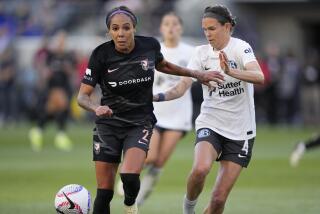NFL, Union Settle Dispute
- Share via
In what might be remembered as a double-overtime victory for the league -- or simply an overdue compromise -- NFL owners Wednesday ended their standoff with the players’ union and approved a six-year extension of the labor agreement.
The owners’ vote was 30-2, with Buffalo and Cincinnati, lower-revenue teams, the dissenting votes. The league also worked out its revenue-sharing issues, which have been the focus of a heated debate among owners over the last two years.
“It was a good compromise,” said Jim Irsay, owner of the Indianapolis Colts. “We’re happy with it; 30-2 is a good vote.”
The news came at the end of two days of debate in an emergency meeting at Dallas-Fort Worth Airport, one arranged after the free-agency deadline was twice pushed back 72 hours. The decision not only preserved labor peace, a cornerstone of the league’s success, but enabled teams to avoid a massive talent purge to comply with what would have been the 2006 salary cap had the collective-bargaining agreement not been extended.
But because of the extension, next season’s cap will be a robust $102 million, about $8 million more than it would have been without a new agreement. Free agency will begin Saturday.
“On behalf of the players, the NFLPA staff and the negotiating team, we are pleased that this process has finally concluded with an agreement,” Gene Upshaw, executive director of the NFL Players’ Assn., said in a statement. “This agreement is not about one side winning or losing. Ultimately, it is about what is best for the players, the owners and the fans of the National Football League.
“Moving forward, this new agreement gives us the opportunity to continue our unprecedented success and growth.”
Although failure to agree on a deal would not have meant a work stoppage, it would have caused many teams to release some of their highest-paid players and could have severely limited their ability to sign free agents and draft picks. It also would have paved the way for an “uncapped” season in 2007, in which the wealthiest teams could stockpile players the way the New York Yankees have in baseball.
Under the new deal, the bottom 17 teams in revenue will not contribute to the player pool, which will be funded with the top five teams contributing the most; the second five less; and the third five less than them.
“Some teams are contributing a little more than others,” Washington Redskin owner Dan Snyder said. “This is really a win-win.”
The players were asking for a greater share of the total revenues produced by the teams, which under their previous agreement did not include money generated by the sale of luxury suites, stadium-naming rights or local TV and radio deals.
In presenting the final union proposal to owners Tuesday, NFL Commissioner Paul Tagliabue included a reminder that many of them had not been there for the player strikes in 1982 and 1987. He emphasized the importance of ending this dispute and working out a solution with the players.
Agent Leigh Steinberg, who represents former USC quarterback Matt Leinart, potentially the top pick in April’s draft, said the bolstered salary cap could lead to record-setting rookie contracts. He said the guaranteed money for the No. 1 pick could be “north of $30 million.”
“That increase in the cap is going to have a dramatic effect on both veteran and rookie salaries,” Steinberg said. “It’s happy days are here again.”
The most heated debate was not between owners and players, but between the owners themselves. Owners of higher-revenue teams -- among them Dallas, Washington and New England -- have been at odds with owners of lower-revenue teams such as Cincinnati, Indianapolis and Jacksonville over which revenue streams should be shared. That argument has raged for at least two years.
Upshaw has contended that the division between the owners needed to be resolved before the agreement could be extended. Without that, the financial pie could not be defined.
The Associated Press contributed to this report.
*
NFL calendar
*--* * Saturday: Free-agency period begins. * March 26-30: Meeting, Orlando, Fla. * April 29-30: NFL draft. * May 23-25: Spring meeting, Denver.
*--*
More to Read
Go beyond the scoreboard
Get the latest on L.A.'s teams in the daily Sports Report newsletter.
You may occasionally receive promotional content from the Los Angeles Times.











